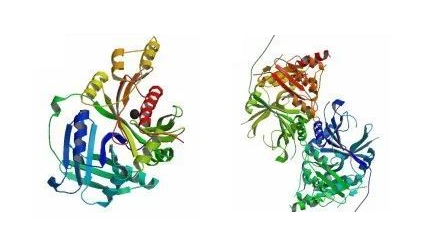Background[1-3]
3-hydroxyaminobenzoic acid dioxygenase antibodies are antibody proteins that can specifically bind to 3-hydroxyaminobenzoic acid dioxygenase. HAAO (3-hydroxyanthranilic acid 3,4-dioxygenase) is a protein-coding gene. Its related pathways include tryptophan metabolism and superpathways. 3-Hydroxyanthranilic acid 3,4-dioxygenase is a monomeric cytosolic protein that belongs to a family of intramolecular dioxygenases containing nonheme ferrous iron.

4-It is widely distributed in peripheral organs such as liver and kidney, and is also found in small amounts in the central nervous system. HAAO catalyzes the synthesis of quinolinic acid (QUIN) from 3-hydroxyanthranilic acid. QUIN is an excitotoxin whose toxicity is mediated by its ability to activate glutamate N-methyl-D-aspartate receptors. Elevated brain levels of QUIN may be involved in the pathogenesis of neurological and inflammatory diseases. 3-Hydroxyanthranilic acid 3,4-dioxygenase (HAO) is a key regulatory enzyme in the NAD synthesis pathway. Normally, normal cells make NAD through any of three biochemical pathways. Simply put, the intracellular NAD+ pool is determined by the balance of production and consumption, and the production of NAD+ mainly depends on the nicotinamide cycle. In addition, there are a variety of NAD+ synthesis pathways, such as a de novo synthesis pathway using tryptophan as raw material.
Apply[4][5]
Structural biology research on key enzymes for the synthesis of heme and ciroheme branches
Determination of the functional fragment of maize uroporphyrinogen methylase dependent on S-adenosylmethionine (S-adenosyl-L-methionine: uroporphyrinogen methyltransferase (SUMT) is an important regulatory enzyme for microbial synthesis of porphyrin compounds such as heme, heme d1, F430 factor and vitamin B12. SUMT in plants is responsible for the regulation of heme biosynthesis. SUMT catalyzes the methylation of uroporphyrinogen III at the C2 and C7 positions. SUMT recombinantly expressed in Escherichia coli will accumulate cyclotrionic acid and the overmethylated product trimethylcorrin in the cells, which are detected under UV light. It produces strong red fluorescence, which can be used to detect the in vivo enzymatic activity of SUMT in the recombinant system. Using different restriction endonucleases, the gene encoding maize SUMT is cut into different fragments and inserted into different expression vectors. The expressed proteins are maize SUMT and the SUMT precursor containing the chloroplast leader peptide, and the N-terminus of SUMT is removed. A truncation mutant of the S-adenosylmethionine binding module, and a truncation mutant that excises the C-terminal 52 amino acid residues of SUMT. Purification and Crystallization of Enzymes for the Biosynthesis of Heme, Heme and NAD Heme and heme in organisms are multifunctional molecules, and the research on the structure and function of the biological enzymes involved in it has made great progress in recent years.
3-Hydroxyanthranilic acid 3,4-dioxygenase (HAO) is a key regulatory enzyme in the NAD synthesis pathway. We cloned, expressed and purified the upstream and midstream enzymes for heme synthesis in Bacillus subtilis, as well as the enzyme for the heme branch synthesis in Sirocco, collected crystal diffraction data of the two enzymes, and cloned, expressed and purified Saccharomyces cerevisiae separately. Two enzymes downstream of heme synthesis and HAO were synthesized, and crystal diffraction data of HAO were collected.
References
[1]Recent advances in chlorophyll biosynthesis[J].David W.Bollivar.Photosynthesis Research.2006(3)
[2]Bacterial heme biosynthesis and its biotechnological application[J].N.Frankenberg,J.Moser,D.Jahn.Applied Microbiology and Biotechnology.2003(2)
[3]Metal binding to Bacillus subtilis ferrochelatase and interaction between metal sites[J].David Lecerof,Michel N.Fodje,Román Alvarez León,Ulf Olsson,Andreas Hansson,Emma Sigfridsson,Ulf Ryde, Mats Hansson,Salam Al-Karadaghi.JBIC Journal of Biological Inorganic Chemistry.2003(4)
[4]The importance of porphyrin distortions for the ferrochelatase reaction[J].Emma Sigfridsson,Ulf Ryde.JBIC Journal of Biological Inorganic Chemistry.2003(3)
[5] Fan Jun. Structural biology study of key enzymes for the synthesis of heme and ciroheme branches [D]. University of Science and Technology of China, 2007.

 微信扫一扫打赏
微信扫一扫打赏

